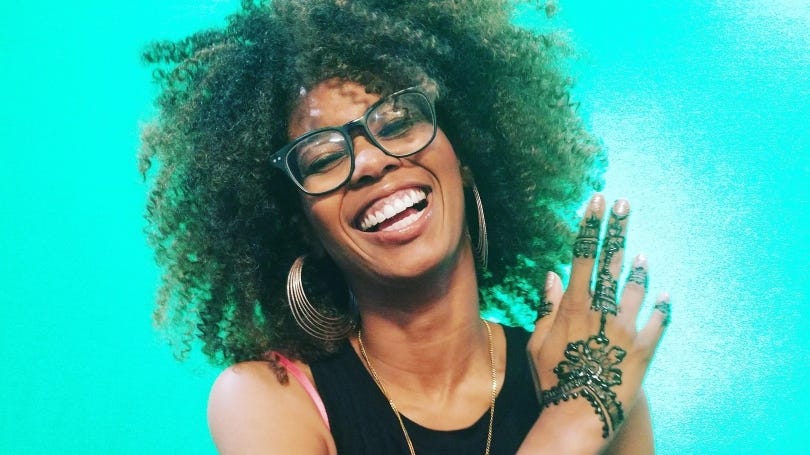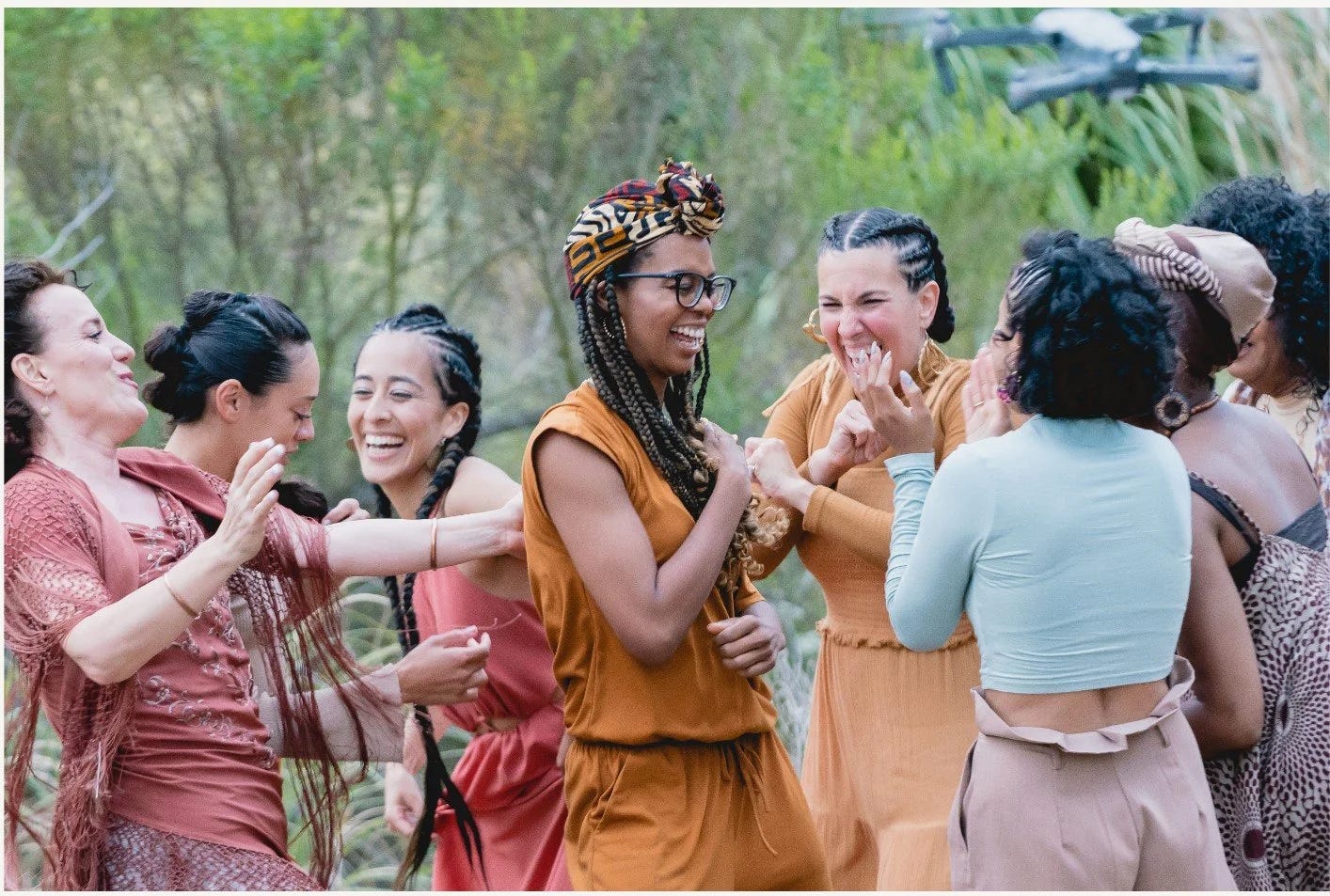North Star Gazing w/ Dr. Shamell Bell
Interview with a Muse: Episode 11
Greetings Interview with a Muse family!
As the student debt crisis continues to burn with the heat of a thousand dumpster fires, I thought it might be time to reach out to my fellow Debt Collective artist, comrade and co-student-debtor extraordinaire. For inspo, of course.
So, I compiled some inquires, scheduled a zoom & sat down to talk with Shamell Bell.
Was this episode supposed to be a video interview? Yes. Did Mercury Retrograde ruin the recording? Of course it did. Did we still make it happen? Absolutely. Because that’s what artists and organizers do—we improvise, adapt, and co-create in real time.
This convo with Dr. Shamell Bell is one of the most layered, heartfelt, and visionary ones I’ve had!
More About Dr. Shamell Bell
A mother, choreographer, street dance activist, community organizer, filmmaker, educator, and proud native of South Central Los Angeles, Shamell holds titles like Visionary Escalator at the Debt Collective and Radical Joy Advisor—titles she imagined for herself because no existing role quite captured the multidimensional magic she brings.
We talked art, debt and liberation. Enjoy!
Maddy: Hi Shamell! Can you start by telling us a bit about yourself?
Shamell Bell: I’m a dancer, a community organizer, and a mother. Street dance is my medium. I call myself the Visionary Instigator of Street Dance Activism, because I’m using movement as a vehicle for liberation. I also work in documentary film and focus on how street dance in South Central L.A. functions as a tool for mobilization.
Maddy Clifford: Tell us about your creative, revolutionary muses?
Shamell Bell: Well, I’m newly late-diagnosed with Autism Spectrum Disorder—Level One. And that helped me understand something about myself: that what I thought were just strong interests or quirks—like my obsession with Jimmy Jam and Terry Lewis—are actually special interests. My brain is my muse. It can pick out producers in music almost instantly. I’m polyphonic. I hear layers in songs that most folks don’t catch. I can trace sonic lineage. “Can You Stand the Rain” unlocked something in me. I can hear a sample of that song in seconds! It’s how I realized my brain processes the world through rhythm.
Maddy Clifford: That’s incredible! And I feel that love for sound and story in everything you do.
Shamell Bell: Another one of my muses is Robin D.G. Kelley. I met him as my undergraduate professor at USC. While someone was giving a presentation on krump, they happened to show a scene from the dance documentary, “Rize,” where I appeared in the “stripper dance” section. I was so embarrassed, hiding under the table, and Robin looked at me and said, “Wait… is that you?” (laughs)
The next day, he told me, “You’re going to research your own people.” That changed my life. He began my PhD journey. His book “Freedom Dreams: The Black Radical Imagination” cracked my mind open—and now, 20 years later, there’s a section in the new edition where he names me as someone who helped collective freedom-dream. That’s full circle.
As a choreographer, I put imagination into action. Dreaming isn’t abstract for me. When you choreograph, you count it out—“5, 6, 7, 8”—and then you move together. That’s how I see collective dreaming. It’s embodied. It’s real.
Maddy Clifford: That’s so powerful and I’m glad you brought up Freedom Dreams. That book changed how I understand the Black radical tradition, too. We often forget how important creativity and spirituality are in movement spaces. People love to talk strategy, but who’s talking about vision? About why we keep going?
We talked offline about Nat Turner receiving vision through the eclipse. Harriet Tubman being led by dreams. These weren’t metaphors—these were impetuses towards serious political acts.
Shamell Bell: Let me just say that Harriet Tubman is one of my revolutionary ancestors. She understood that freedom already existed. She tapped into it and pulled it forward. That’s why I also identify as a quantum activist.
I bring that into organizing spaces through somatic practice, breathwork, movement and healing. Because we can’t build long-term movements if we’re not moving that rage through our bodies. If we don’t alchemize grief, trauma, and burnout, we stay stuck.
That’s why I love what we’re doing with the Debt Collective. Our monthly somatic workshops are about naming shame—calling out the emotional weight we’ve been forced to carry—and then transforming it through breath and ritual. We’ve had sound bowl healers, breathwork leaders like Athena Blue, and collective visioning circles. We’re creating sacred, actionable space in a movement that’s often seen as just economic.
Maddy Clifford: Thank you for bringing us back to how we know one another—through our organizing around debt abolition. One of the most revolutionary things we do at the Debt Collective is talk openly about owning banks, creditors and the federal government. The cathartic process of talking seems very simple, but it truly changes you.
I owe over $100,000 in student loans. Saying that out loud used to feel terrifying. Now? It feels freeing.
Because once I name it, other people do too. It kind of gives them permission. Sometimes it feels like relief to share how much we owe. Sometimes people feel a sense of collective rage. And it all makes sense because debt is older than money. Debt isn’t just financial—it’s spiritual. The ruling class wants us to feel ashamed for trying to survive and thrive. But the truth is: this whole system is guilty as hell, not us.
Shamell Bell: Exactly. People assume I racked up $250,000 in debt simply for school. But I had scholarships. I was a Teaching Assistant. I hustled. The debt didn’t come from tuition. It came from housing, food, healthcare. It came from survival.
Even with a PhD—from UCLA’s World Arts and Cultures program—I’ve faced job insecurity. Academia can be a system of hazing, especially for Black women. I was lecturing at Dartmouth, at Harvard, but now? I’m not teaching at all. I’m fighting to access Medicaid. And still, people question whether I “needed” that degree.
Let me say this loud: I absolutely needed that degree. It was never about status. It was about access, about purpose. About breaking through the barriers that were never designed for us to pass.
Maddy Clifford: I resonate with what you’re saying and want to remind folks to sign up for your workshops to experience somatic healing. All of Debt Collective’s workshops can be found here.
You’ve dropped a lot of wisdom Shamell, and I want to close by asking you this:
What advice do you have for young artists?
Those just finding their voice.
Those navigating their dreams and their fears.
What do you want them to know?
Shamell Bell: I always think of that iconic Allen Iverson clip: “Practice? Not the game. Practice?” (laughs) It became a meme, but it’s real.
Because practice is everything. It sharpens your craft. It builds your confidence. It keeps you connected to your why.
And in this social media world where everything is immediate and polished and filtered, I want young artists to remember: mastery takes time. Don’t skip the messy middle. Don’t lose your joy chasing someone else’s algorithm.
And don’t lose your integrity. Your creativity is sacred.
There’s never been a social movement without art. Never.
Art is how we dream together. It’s how we survive. So when people tell you that your art degree doesn’t matter, or your creative gifts aren’t practical—just know: they’re powerful. And they’re essential.
We need artists who can see the world we haven’t built yet. We need you. You might be holding the answer we’ve been waiting for.
And finally—collaborate. Find your crew. Build collectives. Make life with your people. My work—from street dance activism to film to education—has always been collective.
We do this together.



